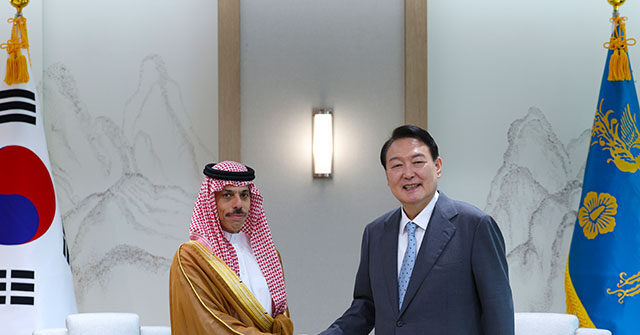In a meeting with Abdullah bin Bandar Al Saud, head of the Saudi National Guard, South Korean President Yoon Suk-yeol emphasized South Korea’s potential as a prime partner for Saudi Arabia, particularly in defense development and technology. Since Yoon assumed office in 2022, he has prioritized strengthening the bilateral relationship with Saudi Arabia by focusing on defense sales and technological collaborations. Yoon’s visit to Saudi Arabia in 2023 marked a historic moment, as it was the first visit by a South Korean president to the kingdom, during which several agreements were reached to transfer Korean technology and work on joint defense projects.
The meeting between Yoon and Al Saud included a showcase of advanced weapons systems, emphasizing the importance South Korea places on military collaboration with Saudi Arabia. President Yoon remarked that the defense partnership would enhance Saudi Arabia’s military capabilities while also deepening the ties between the two nations. His messaging casts South Korea as Saudi Arabia’s best ally in addressing its defense needs, particularly amidst the backdrop of shifting geopolitical alliances.
The South Korean Defense Minister Kim Yong-hyun echoed Yoon’s sentiments, calling Saudi Arabia a key trade partner in the Middle East and affirming ongoing efforts to introduce new ground defense equipment through collaborations. The identification of South Korea as a robust ally reflects a strategic pivot in Riyadh’s defense partnerships, particularly in light of the recent deterioration in U.S.-Saudi relations under President Joe Biden. The Biden administration’s cessation of offensive arms sales to Saudi Arabia has created an opening for South Korea to step in as a vital support system for Riyadh.
During Yoon’s trip to Saudi Arabia, he not only focused on defense collaborations but also presented South Korea as a key partner in the broader context of Saudi Arabia’s economic diversification plan, “Vision 2030.” This ambitious initiative aims to reduce the kingdom’s dependency on oil by expanding its economy through various sectors, including massive urban projects like the new megacity Neom. South Korean firms, including industry giants like Hyundai, have been actively involved in these developmental projects, showcasing the potential for extensive economic cooperation beyond defense.
Despite Yoon’s advocacy for partnerships outside of the fossil fuel sector, there has been a notable increase in South Korea’s importation of Saudi oil following the president’s visit. Reports from early 2024 indicated that the two countries were finalizing significant defense agreements, including a memorandum of understanding that would enable joint research and development of advanced weapon systems. This indicates a deepening commitment to defense collaboration alongside continued engagement in the oil sector.
The burgeoning defense relationship was solidified with a significant purchase of South Korea’s Cheongung M-SAM II surface-to-air missile system by Saudi Arabia, further highlighting the kingdom’s openness to South Korean defense technology. The successful sale of such advanced weaponry and the establishment of joint developmental projects underscore South Korea’s emergence as a strategic partner for Saudi Arabia in navigating both regional security dynamics and economic diversification initiatives. This engagement reflects a broader shift in how countries are reassessing alliances in a changing global landscape, and places South Korea at the forefront of defense collaborations in the Middle East.

